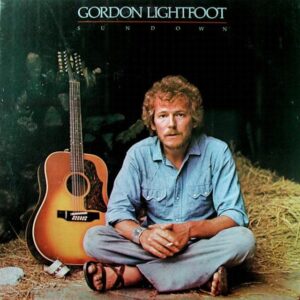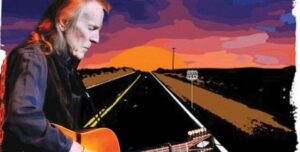Gordon Lightfoot, an iconic Canadian folksinger-songwriter known for his evocative, poetic and stirring songs, died of natural causes in a Toronto hospital on May 1, 2023 at age 84.
Born in Orillia, Ontario on November 17, 1938, Lightfoot reportedly began singing on a local radio station at age five and sang in his church choir as a child, He penned his first song (“The Hula Hoop Song”) in 1955, while still in high school. After graduation, he moved to Los Angeles, California to further his education before returning to Canada in 1959. Inspired, at least in part, by the songs of Bob Dylan (who similarly admired him), Lightfoot became part of and was among the best-known and most widely acclaimed singer-songwriters to emerge from Toronto’s burgeoning folk music scene of the 1960s that was centered around the folk clubs of the city’s Yorkville neighborhood. His first album, entitled Lightfoot!, was released in 1966. The following year, he performed the first of what was to become an annual tradition of concerts at Toronto’s famed Massey Hall and did so continuously until the mid-1980s when it became a once every 18 months or so affair before resuming them annually in 2005.

Released in 1974, Gordon Lightfoot’s album Sundown topped the Billboard charts, as did its title track.
A prolific songwriter and a beloved chronicler of Canadian culture and history, Lightfoot’s own personal experiences and Canada’s national identity figured prominently in his songs. His 1976 hit “The Wreck of the Edmund Fitzgerald,” one of his most well-known and oft-covered ballads, poignantly tells the story of the last hours of 29 crew members aboard a freighter that sank in a storm on Lake Superior the previous November in one of the most famous Great Lakes shipwrecks. “Canadian Railroad Trilogy,” another of his well-loved songs, paid tribute to those who constructed Canada’s national railroad.
A globetrotting artist, Lightfoot toured throughout the U.S. and Europe, as well as his native Canada. During the 1980s, he beat alcoholism. However, he was to face other serious health challenges – including suffering from Bell’s pPalsy, a disease of the peripheral nervous system. In September 2002, Lightfoot also suffered severe stomach and abdominal pains while preparing to take the stage for a concert in his beloved hometown. He was airlifted to hospital, where doctors determined that he had ruptured an artery that required multiple surgeries. He was in a coma for six weeks and spent nearly three months in the hospital.
With his indefatigable spirit, Lightfoot released a new album, Harmony, in 2004 and made his comeback live performance at Ontario’s famed Mariposa Festival that summer.

Image from Lightfoot.ca, where more information on the iconic singer-songwriter, including a complete discography, can be found.
Lightfoot’s songs have been covered by such other musical luminaries as Johnny Cash, Judy Collins, Bob Dylan, Richie Havens, Ian and Sylvia (who were part of the 1960s Toronto folk scene with him), Sarah MacLachlan, Anne Murray, and Peter, Paul & Mary (who had hits with “Early Morning Rain” and “For Lovin’ Me”). In the liner notes for his own 1985 box set, Biograph, Bob Dylan wrote: “ Gordon Lightfoot, every time I hear a song of his, it’s like I wish it would last forever.” Lightfoot released his last studio album, Solo, in 2020.
Despite his serious health challenges and a distinctive, warm tenor voice that had grown thinner over the years, Lightfoot was a road warrior who loved to tour and perform live. Indeed, he continued to do so until several weeks before his death. On April 11, he cancelled his remaining tour dates for the year, citing health reasons.
Hailing Lightfoot as “one of our greatest singer-songwriters,” Canadian Prime Minister Justin Trudeau said he “captured our country’s spirit in his music – and in doing so, he helped shape Canada’s soundscape.”

Like/Follow Us!